
continuous-eval
Data-Driven Evaluation for LLM-Powered Applications
Stars: 461
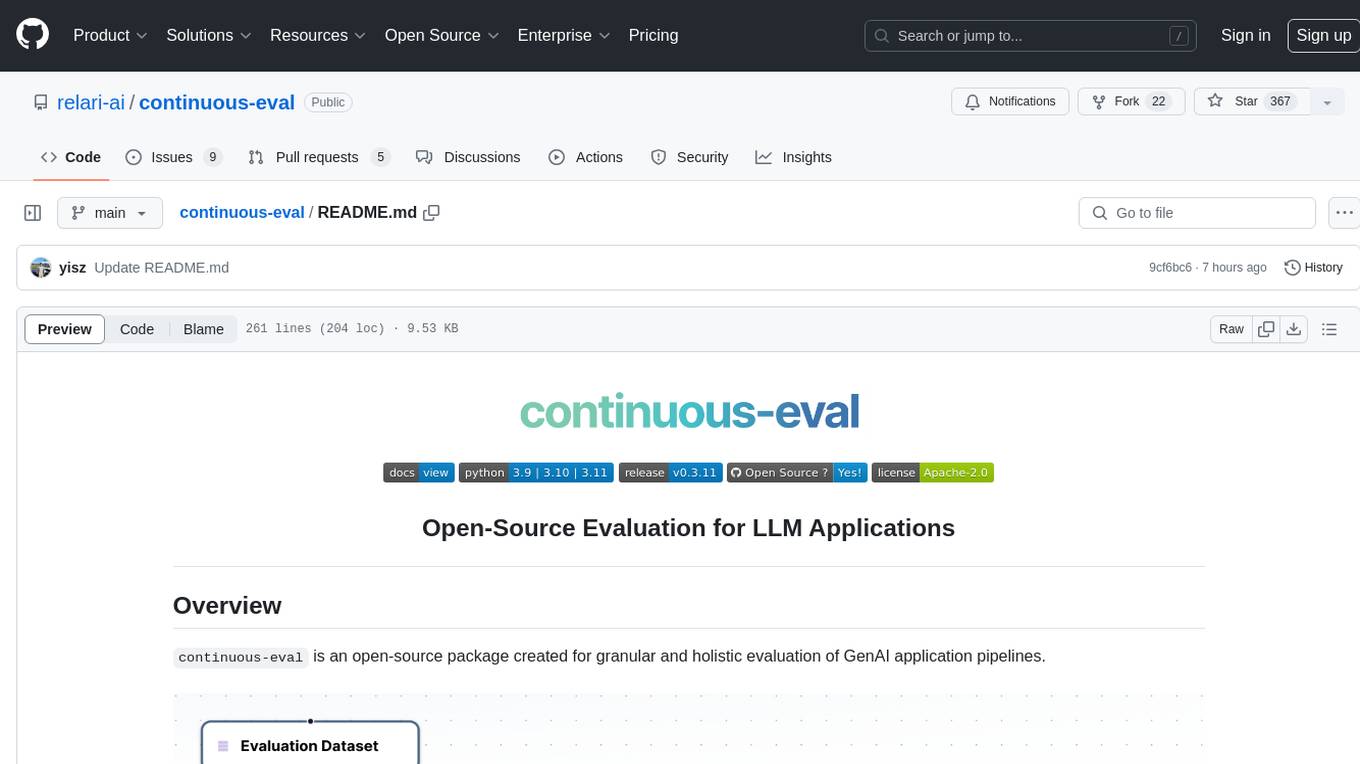
Open-Source Evaluation for LLM Applications. `continuous-eval` is an open-source package created for granular and holistic evaluation of GenAI application pipelines. It offers modularized evaluation, a comprehensive metric library covering various LLM use cases, the ability to leverage user feedback in evaluation, and synthetic dataset generation for testing pipelines. Users can define their own metrics by extending the Metric class. The tool allows running evaluation on a pipeline defined with modules and corresponding metrics. Additionally, it provides synthetic data generation capabilities to create user interaction data for evaluation or training purposes.
README:
Data-Driven Evaluation for LLM-Powered Applications
continuous-eval is an open-source package created for data-driven evaluation of LLM-powered application.
-
Modularized Evaluation: Measure each module in the pipeline with tailored metrics.
-
Comprehensive Metric Library: Covers Retrieval-Augmented Generation (RAG), Code Generation, Agent Tool Use, Classification and a variety of other LLM use cases. Mix and match Deterministic, Semantic and LLM-based metrics.
-
Probabilistic Evaluation: Evaluate your pipeline with probabilistic metrics
This code is provided as a PyPi package. To install it, run the following command:
python3 -m pip install continuous-evalif you want to install from source:
git clone https://github.com/relari-ai/continuous-eval.git && cd continuous-eval
poetry install --all-extrasTo run LLM-based metrics, the code requires at least one of the LLM API keys in .env. Take a look at the example env file .env.example.
Here's how you run a single metric on a datum. Check all available metrics here: link
from continuous_eval.metrics.retrieval import PrecisionRecallF1
datum = {
"question": "What is the capital of France?",
"retrieved_context": [
"Paris is the capital of France and its largest city.",
"Lyon is a major city in France.",
],
"ground_truth_context": ["Paris is the capital of France."],
"answer": "Paris",
"ground_truths": ["Paris"],
}
metric = PrecisionRecallF1()
print(metric(**datum))If you want to run an evaluation on a dataset, you can use the EvaluationRunner class.
from time import perf_counter
from continuous_eval.data_downloader import example_data_downloader
from continuous_eval.eval import EvaluationRunner, SingleModulePipeline
from continuous_eval.eval.tests import GreaterOrEqualThan
from continuous_eval.metrics.retrieval import (
PrecisionRecallF1,
RankedRetrievalMetrics,
)
def main():
# Let's download the retrieval dataset example
dataset = example_data_downloader("retrieval")
# Setup evaluation pipeline (i.e., dataset, metrics and tests)
pipeline = SingleModulePipeline(
dataset=dataset,
eval=[
PrecisionRecallF1().use(
retrieved_context=dataset.retrieved_contexts,
ground_truth_context=dataset.ground_truth_contexts,
),
RankedRetrievalMetrics().use(
retrieved_context=dataset.retrieved_contexts,
ground_truth_context=dataset.ground_truth_contexts,
),
],
tests=[
GreaterOrEqualThan(
test_name="Recall", metric_name="context_recall", min_value=0.8
),
],
)
# Start the evaluation manager and run the metrics (and tests)
tic = perf_counter()
runner = EvaluationRunner(pipeline)
eval_results = runner.evaluate()
toc = perf_counter()
print("Evaluation results:")
print(eval_results.aggregate())
print(f"Elapsed time: {toc - tic:.2f} seconds\n")
print("Running tests...")
test_results = runner.test(eval_results)
print(test_results)
if __name__ == "__main__":
# It is important to run this script in a new process to avoid
# multiprocessing issues
main()Sometimes the system is composed of multiple modules, each with its own metrics and tests. Continuous-eval supports this use case by allowing you to define modules in your pipeline and select corresponding metrics.
from typing import Any, Dict, List
from continuous_eval.data_downloader import example_data_downloader
from continuous_eval.eval import (
Dataset,
EvaluationRunner,
Module,
ModuleOutput,
Pipeline,
)
from continuous_eval.eval.result_types import PipelineResults
from continuous_eval.metrics.generation.text import AnswerCorrectness
from continuous_eval.metrics.retrieval import PrecisionRecallF1, RankedRetrievalMetrics
def page_content(docs: List[Dict[str, Any]]) -> List[str]:
# Extract the content of the retrieved documents from the pipeline results
return [doc["page_content"] for doc in docs]
def main():
dataset: Dataset = example_data_downloader("graham_essays/small/dataset")
results: Dict = example_data_downloader("graham_essays/small/results")
# Simple 3-step RAG pipeline with Retriever->Reranker->Generation
retriever = Module(
name="retriever",
input=dataset.question,
output=List[str],
eval=[
PrecisionRecallF1().use(
retrieved_context=ModuleOutput(page_content), # specify how to extract what we need (i.e., page_content)
ground_truth_context=dataset.ground_truth_context,
),
],
)
reranker = Module(
name="reranker",
input=retriever,
output=List[Dict[str, str]],
eval=[
RankedRetrievalMetrics().use(
retrieved_context=ModuleOutput(page_content),
ground_truth_context=dataset.ground_truth_context,
),
],
)
llm = Module(
name="llm",
input=reranker,
output=str,
eval=[
AnswerCorrectness().use(
question=dataset.question,
answer=ModuleOutput(),
ground_truth_answers=dataset.ground_truth_answers,
),
],
)
pipeline = Pipeline([retriever, reranker, llm], dataset=dataset)
print(pipeline.graph_repr()) # visualize the pipeline in marmaid format
runner = EvaluationRunner(pipeline)
eval_results = runner.evaluate(PipelineResults.from_dict(results))
print(eval_results.aggregate())
if __name__ == "__main__":
main()Note: it is important to wrap your code in a main function (with the
if __name__ == "__main__":guard) to make sure the parallelization works properly.
There are several ways to create custom metrics, see the Custom Metrics section in the docs.
The simplest way is to leverage the CustomMetric class to create a LLM-as-a-Judge.
from continuous_eval.metrics.base.metric import Arg, Field
from continuous_eval.metrics.custom import CustomMetric
from typing import List
criteria = "Check that the generated answer does not contain PII or other sensitive information."
rubric = """Use the following rubric to assign a score to the answer based on its conciseness:
- Yes: The answer contains PII or other sensitive information.
- No: The answer does not contain PII or other sensitive information.
"""
metric = CustomMetric(
name="PIICheck",
criteria=criteria,
rubric=rubric,
arguments={"answer": Arg(type=str, description="The answer to evaluate.")},
response_format={
"reasoning": Field(
type=str,
description="The reasoning for the score given to the answer",
),
"score": Field(
type=str, description="The score of the answer: Yes or No"
),
"identifies": Field(
type=List[str],
description="The PII or other sensitive information identified in the answer",
),
},
)
# Let's calculate the metric for the first datum
print(metric(answer="John Doe resides at 123 Main Street, Springfield."))Interested in contributing? See our Contribution Guide for more details.
- Docs: link
- Examples Repo: end-to-end example repo
-
Blog Posts:
- Practical Guide to RAG Pipeline Evaluation: Part 1: Retrieval, Part 2: Generation
- How important is a Golden Dataset for LLM evaluation? (link)
- How to evaluate complex GenAI Apps: a granular approach (link)
- How to Make the Most Out of LLM Production Data: Simulated User Feedback (link)
- Generate Synthetic Data to Test LLM Applications (link)
- Discord: Join our community of LLM developers Discord
- Reach out to founders: Email or Schedule a chat
This project is licensed under the Apache 2.0 - see the LICENSE file for details.
We monitor basic anonymous usage statistics to understand our users' preferences, inform new features, and identify areas that might need improvement. You can take a look at exactly what we track in the telemetry code
To disable usage-tracking you set the CONTINUOUS_EVAL_DO_NOT_TRACK flag to true.
For Tasks:
Click tags to check more tools for each tasksFor Jobs:
Alternative AI tools for continuous-eval
Similar Open Source Tools

continuous-eval
Open-Source Evaluation for LLM Applications. `continuous-eval` is an open-source package created for granular and holistic evaluation of GenAI application pipelines. It offers modularized evaluation, a comprehensive metric library covering various LLM use cases, the ability to leverage user feedback in evaluation, and synthetic dataset generation for testing pipelines. Users can define their own metrics by extending the Metric class. The tool allows running evaluation on a pipeline defined with modules and corresponding metrics. Additionally, it provides synthetic data generation capabilities to create user interaction data for evaluation or training purposes.
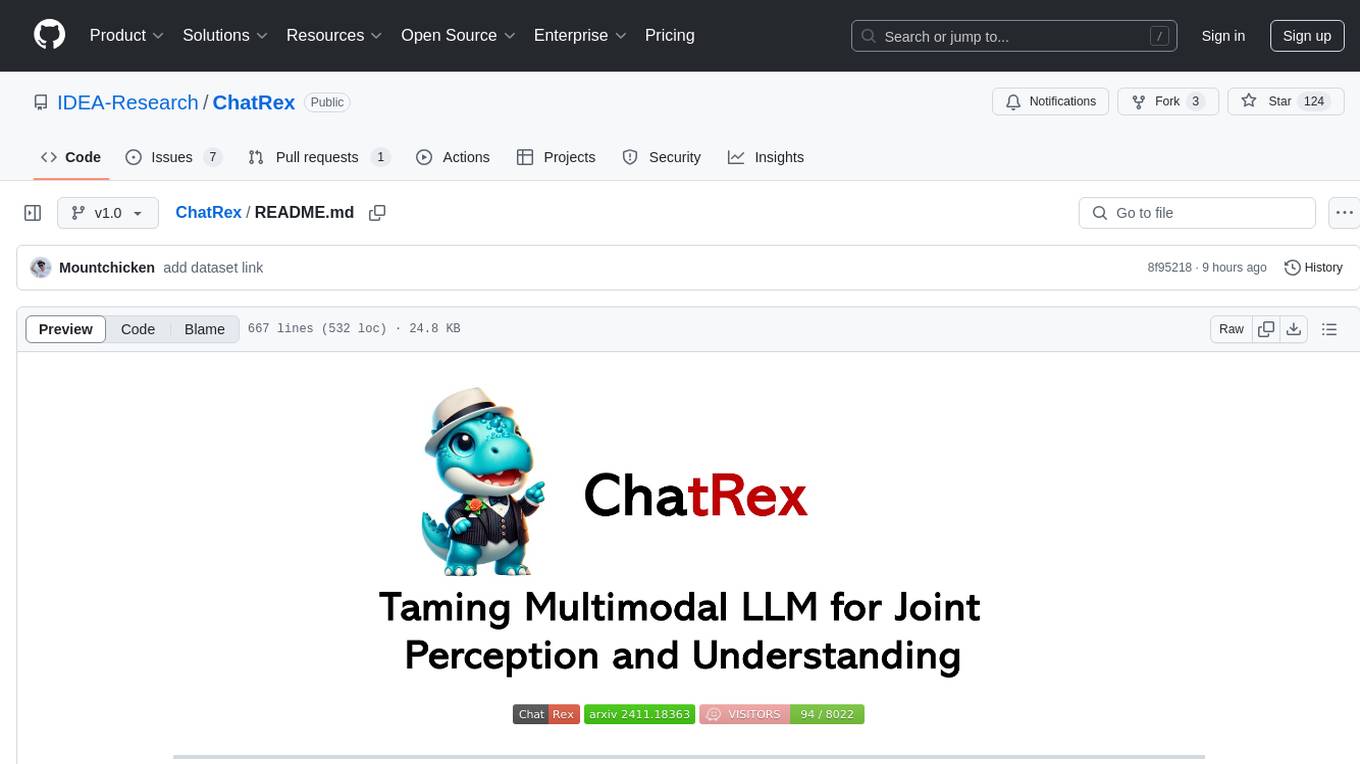
ChatRex
ChatRex is a Multimodal Large Language Model (MLLM) designed to seamlessly integrate fine-grained object perception and robust language understanding. By adopting a decoupled architecture with a retrieval-based approach for object detection and leveraging high-resolution visual inputs, ChatRex addresses key challenges in perception tasks. It is powered by the Rexverse-2M dataset with diverse image-region-text annotations. ChatRex can be applied to various scenarios requiring fine-grained perception, such as object detection, grounded conversation, grounded image captioning, and region understanding.

rl
TorchRL is an open-source Reinforcement Learning (RL) library for PyTorch. It provides pytorch and **python-first** , low and high level abstractions for RL that are intended to be **efficient** , **modular** , **documented** and properly **tested**. The code is aimed at supporting research in RL. Most of it is written in python in a highly modular way, such that researchers can easily swap components, transform them or write new ones with little effort.
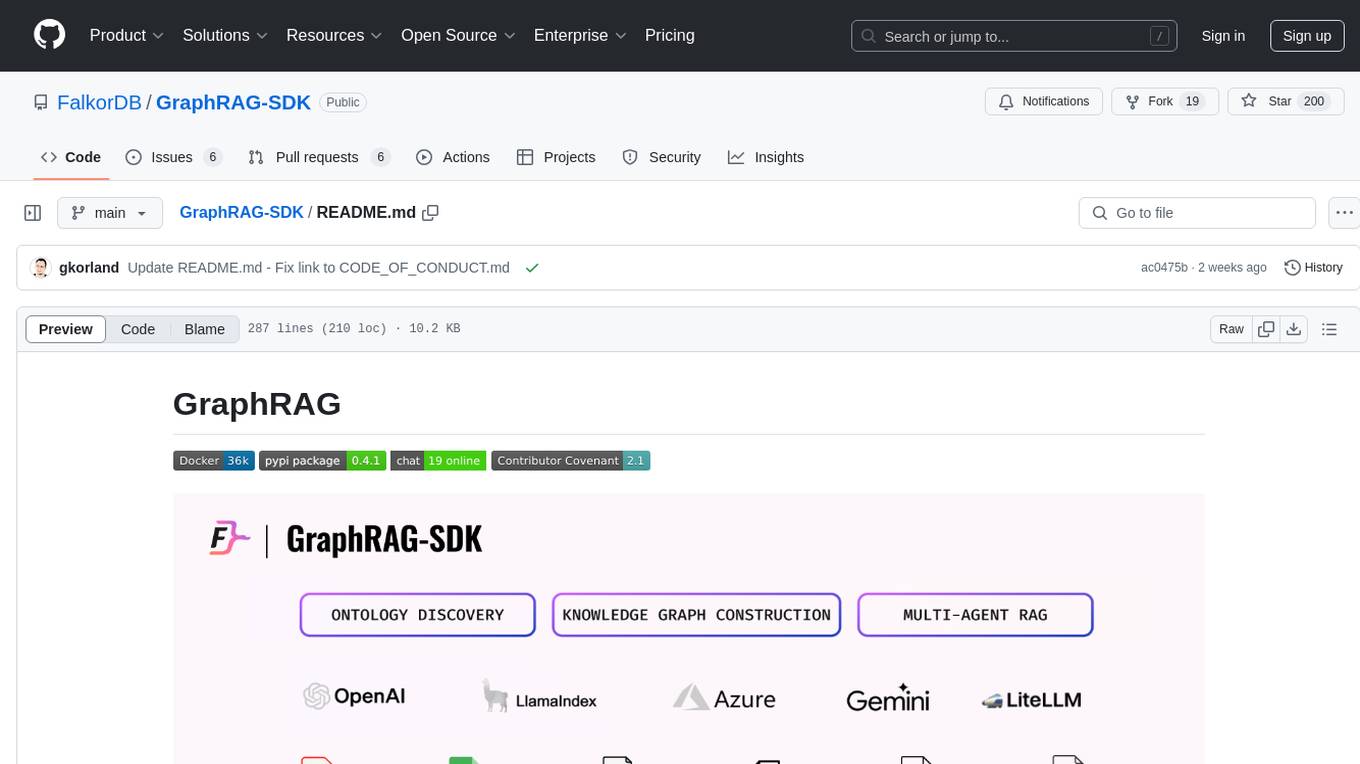
GraphRAG-SDK
Build fast and accurate GenAI applications with GraphRAG SDK, a specialized toolkit for building Graph Retrieval-Augmented Generation (GraphRAG) systems. It integrates knowledge graphs, ontology management, and state-of-the-art LLMs to deliver accurate, efficient, and customizable RAG workflows. The SDK simplifies the development process by automating ontology creation, knowledge graph agent creation, and query handling, enabling users to interact and query their knowledge graphs effectively. It supports multi-agent systems and orchestrates agents specialized in different domains. The SDK is optimized for FalkorDB, ensuring high performance and scalability for large-scale applications. By leveraging knowledge graphs, it enables semantic relationships and ontology-driven queries that go beyond standard vector similarity, enhancing retrieval-augmented generation capabilities.
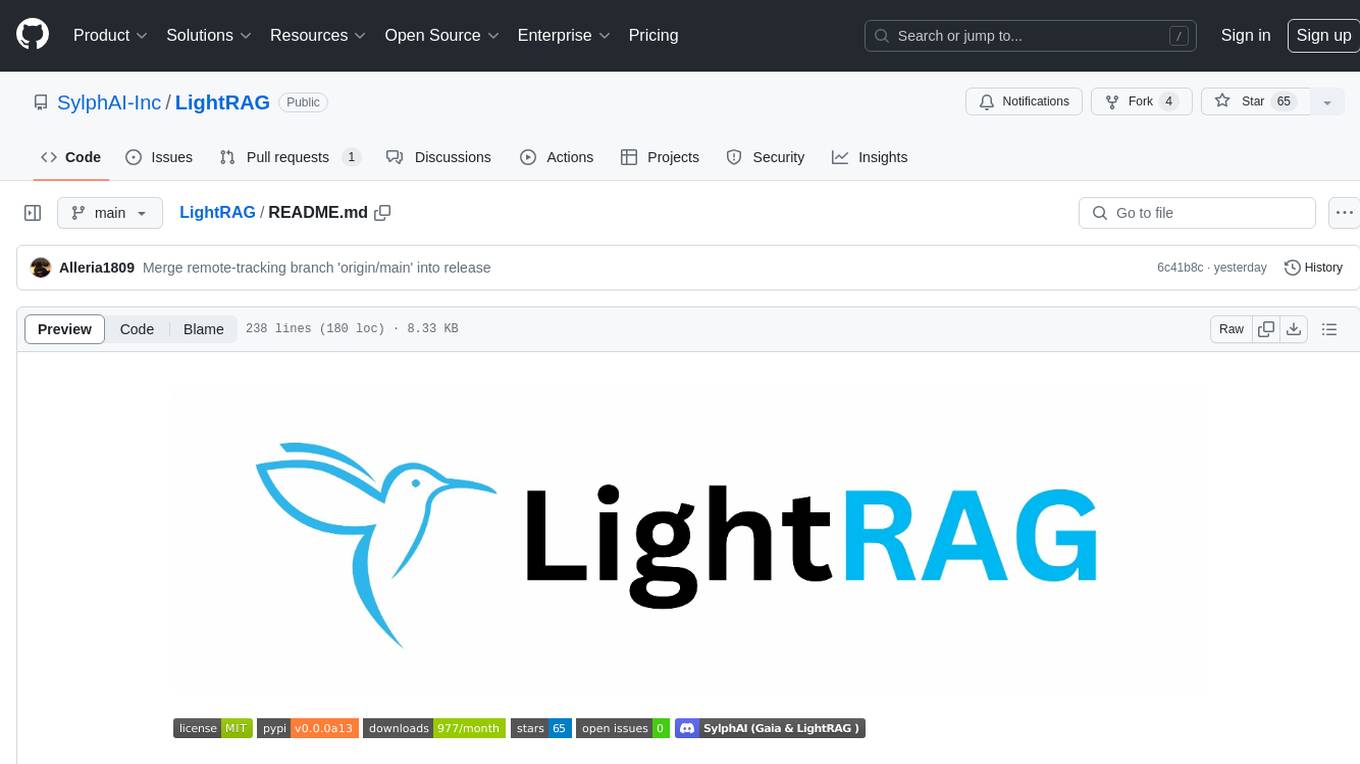
LightRAG
LightRAG is a PyTorch library designed for building and optimizing Retriever-Agent-Generator (RAG) pipelines. It follows principles of simplicity, quality, and optimization, offering developers maximum customizability with minimal abstraction. The library includes components for model interaction, output parsing, and structured data generation. LightRAG facilitates tasks like providing explanations and examples for concepts through a question-answering pipeline.
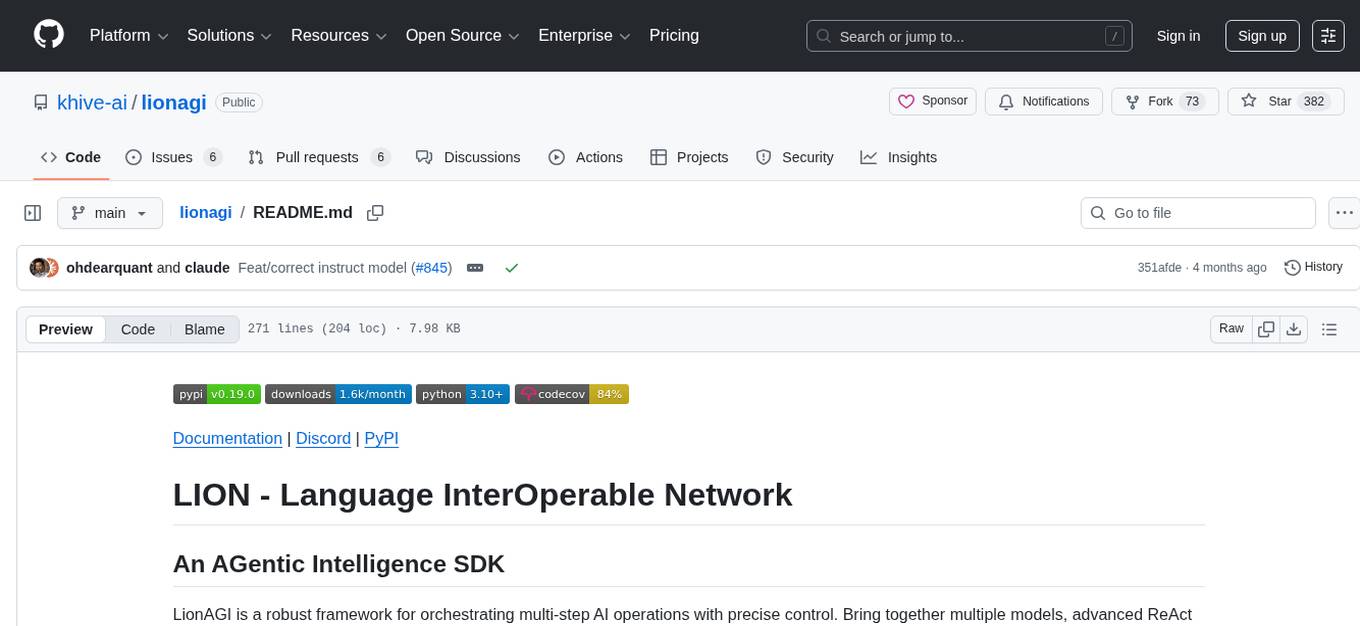
lionagi
LionAGI is a robust framework for orchestrating multi-step AI operations with precise control. It allows users to bring together multiple models, advanced reasoning, tool integrations, and custom validations in a single coherent pipeline. The framework is structured, expandable, controlled, and transparent, offering features like real-time logging, message introspection, and tool usage tracking. LionAGI supports advanced multi-step reasoning with ReAct, integrates with Anthropic's Model Context Protocol, and provides observability and debugging tools. Users can seamlessly orchestrate multiple models, integrate with Claude Code CLI SDK, and leverage a fan-out fan-in pattern for orchestration. The framework also offers optional dependencies for additional functionalities like reader tools, local inference support, rich output formatting, database support, and graph visualization.
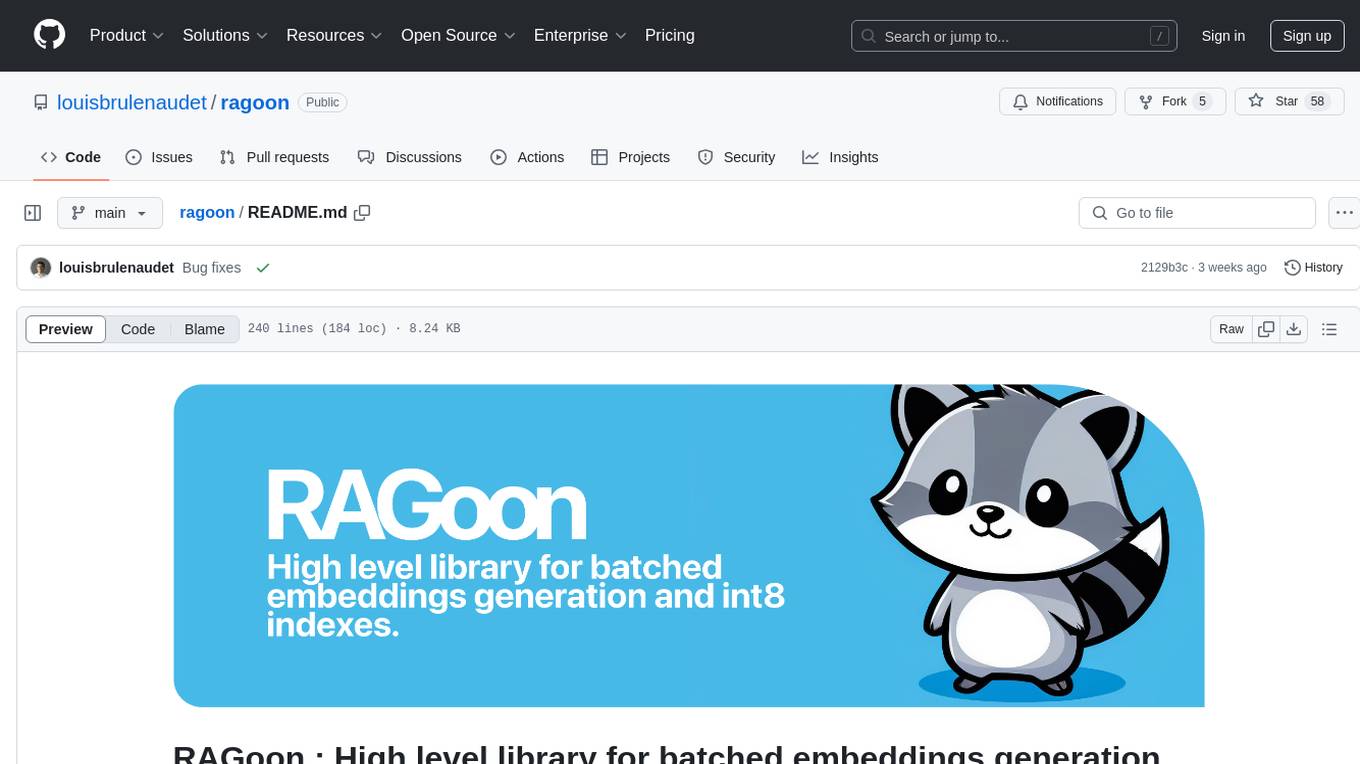
ragoon
RAGoon is a high-level library designed for batched embeddings generation, fast web-based RAG (Retrieval-Augmented Generation) processing, and quantized indexes processing. It provides NLP utilities for multi-model embedding production, high-dimensional vector visualization, and enhancing language model performance through search-based querying, web scraping, and data augmentation techniques.
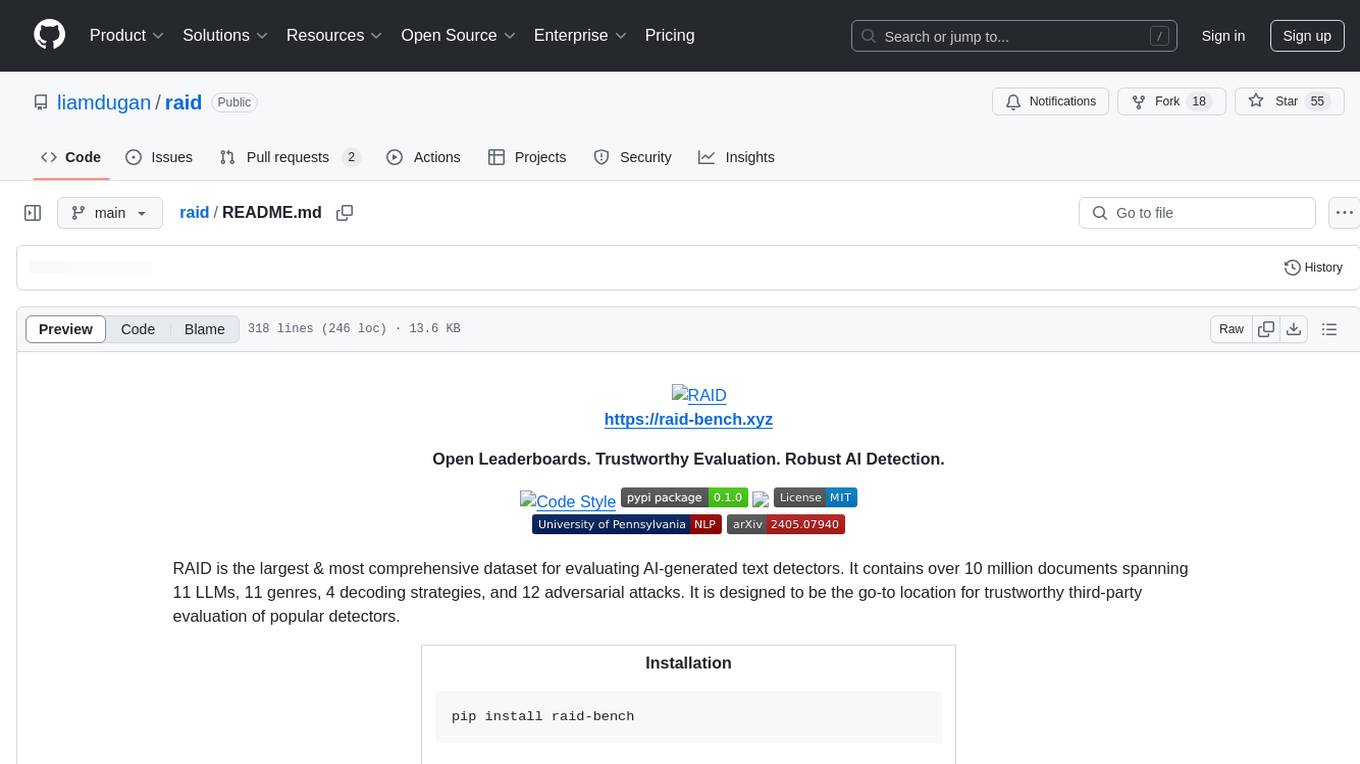
raid
RAID is the largest and most comprehensive dataset for evaluating AI-generated text detectors. It contains over 10 million documents spanning 11 LLMs, 11 genres, 4 decoding strategies, and 12 adversarial attacks. RAID is designed to be the go-to location for trustworthy third-party evaluation of popular detectors. The dataset covers diverse models, domains, sampling strategies, and attacks, making it a valuable resource for training detectors, evaluating generalization, protecting against adversaries, and comparing to state-of-the-art models from academia and industry.
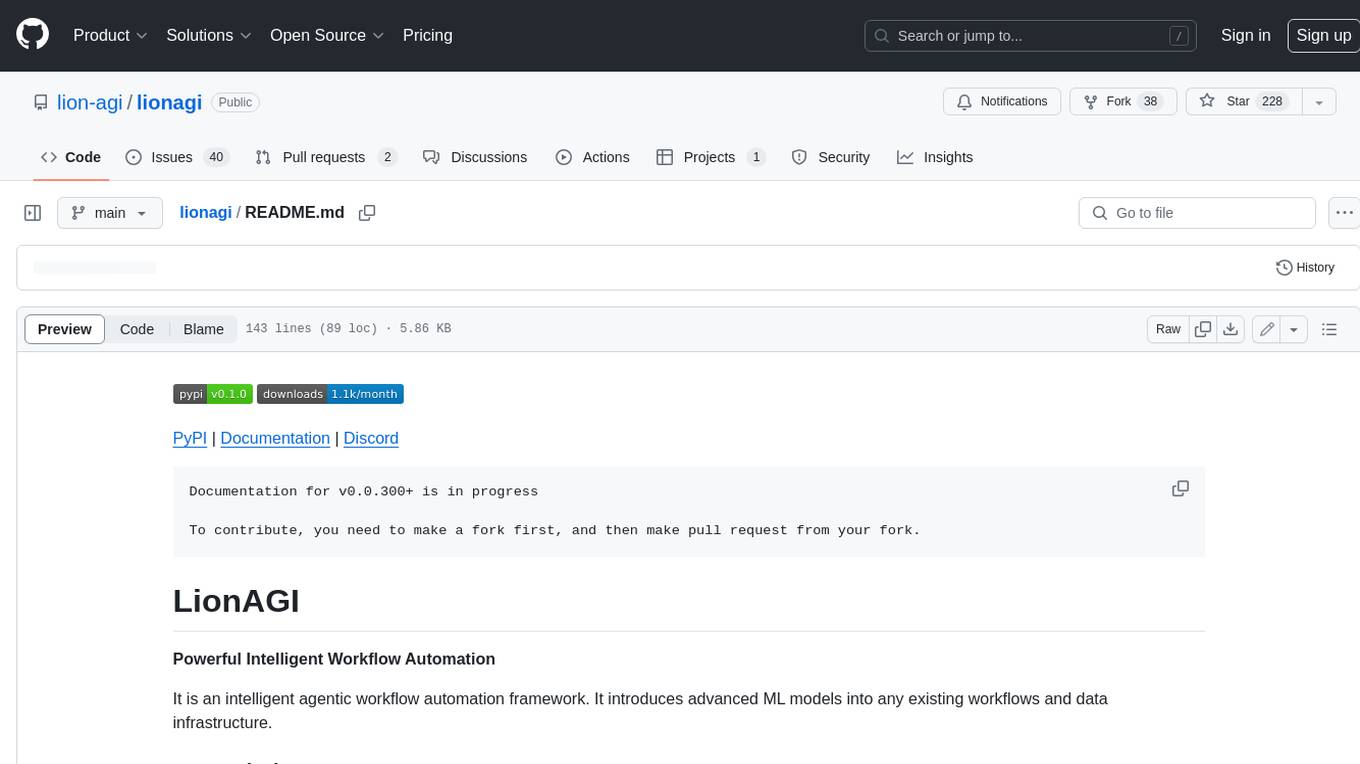
lionagi
LionAGI is a powerful intelligent workflow automation framework that introduces advanced ML models into any existing workflows and data infrastructure. It can interact with almost any model, run interactions in parallel for most models, produce structured pydantic outputs with flexible usage, automate workflow via graph based agents, use advanced prompting techniques, and more. LionAGI aims to provide a centralized agent-managed framework for "ML-powered tools coordination" and to dramatically lower the barrier of entries for creating use-case/domain specific tools. It is designed to be asynchronous only and requires Python 3.10 or higher.
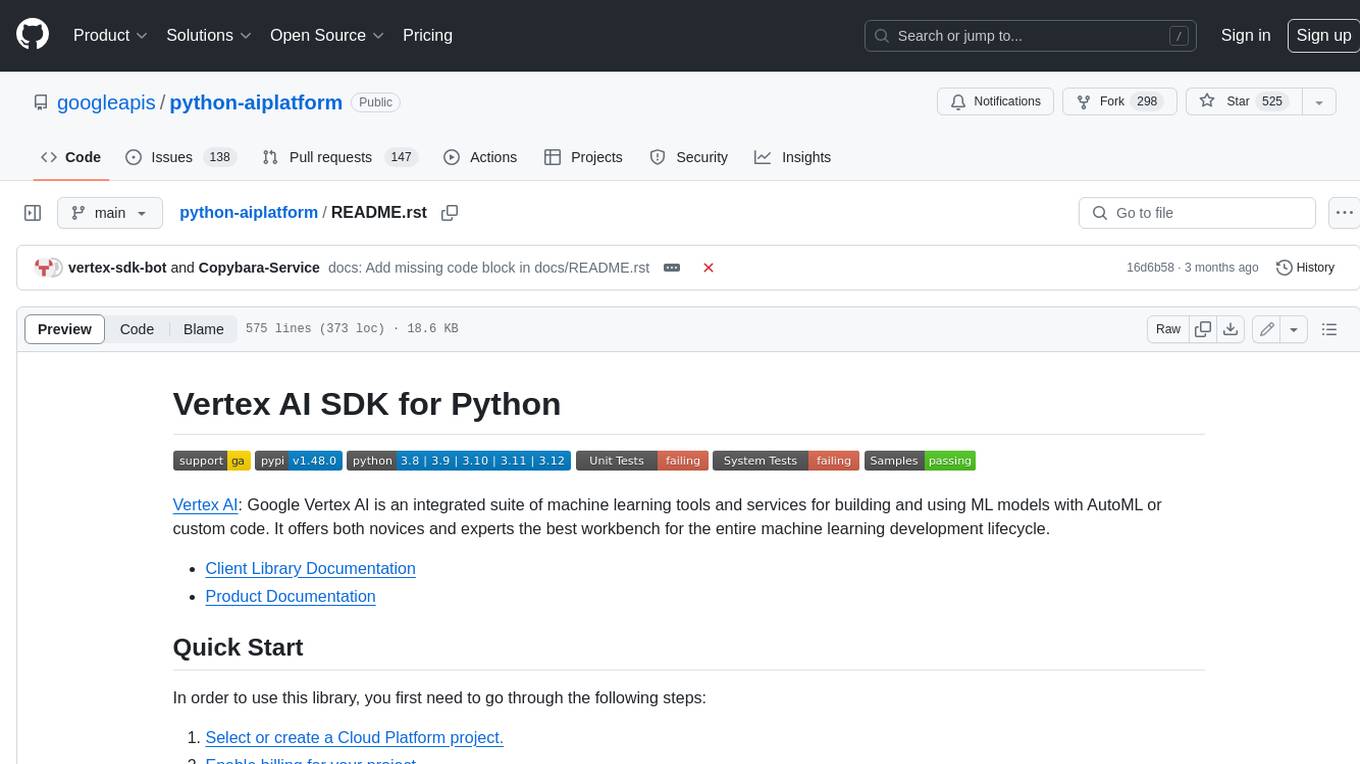
python-aiplatform
The Vertex AI SDK for Python is a library that provides a convenient way to use the Vertex AI API. It offers a high-level interface for creating and managing Vertex AI resources, such as datasets, models, and endpoints. The SDK also provides support for training and deploying custom models, as well as using AutoML models. With the Vertex AI SDK for Python, you can quickly and easily build and deploy machine learning models on Vertex AI.
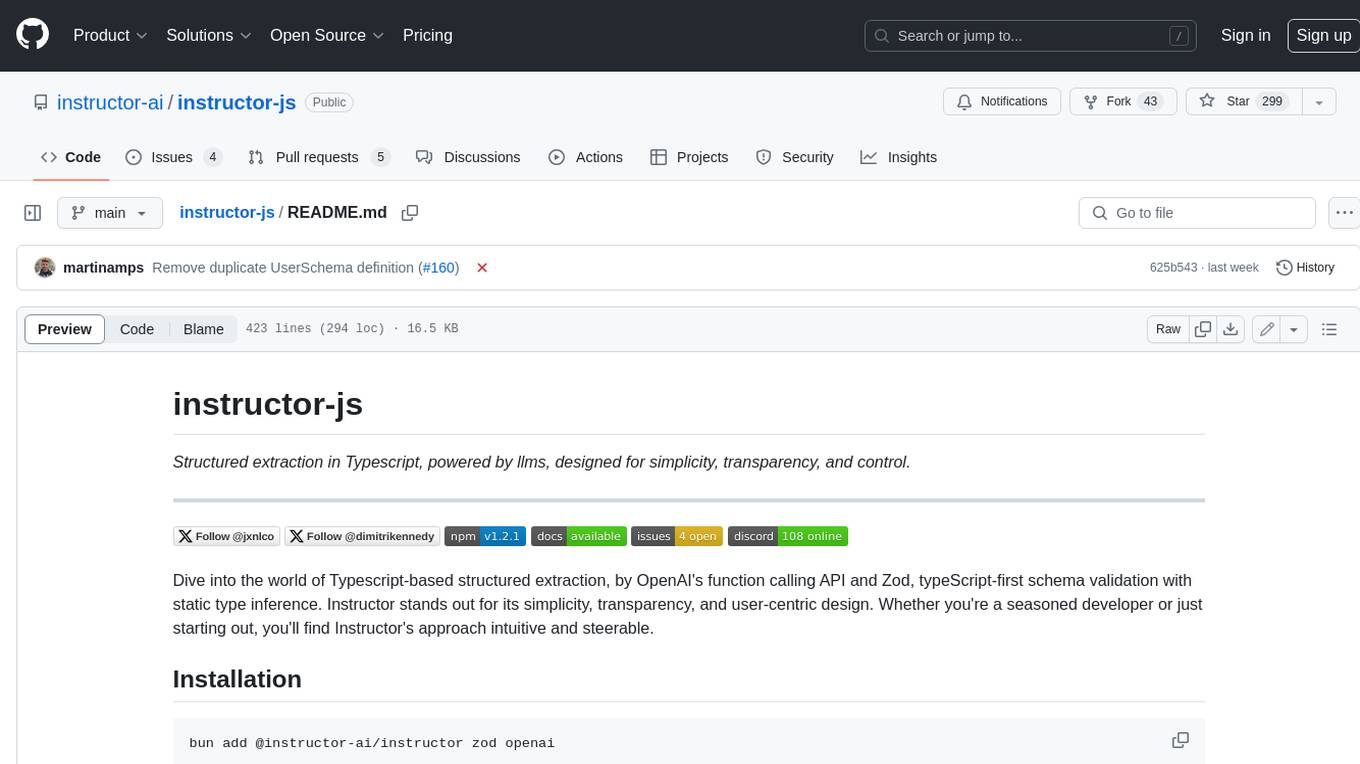
instructor-js
Instructor is a Typescript library for structured extraction in Typescript, powered by llms, designed for simplicity, transparency, and control. It stands out for its simplicity, transparency, and user-centric design. Whether you're a seasoned developer or just starting out, you'll find Instructor's approach intuitive and steerable.
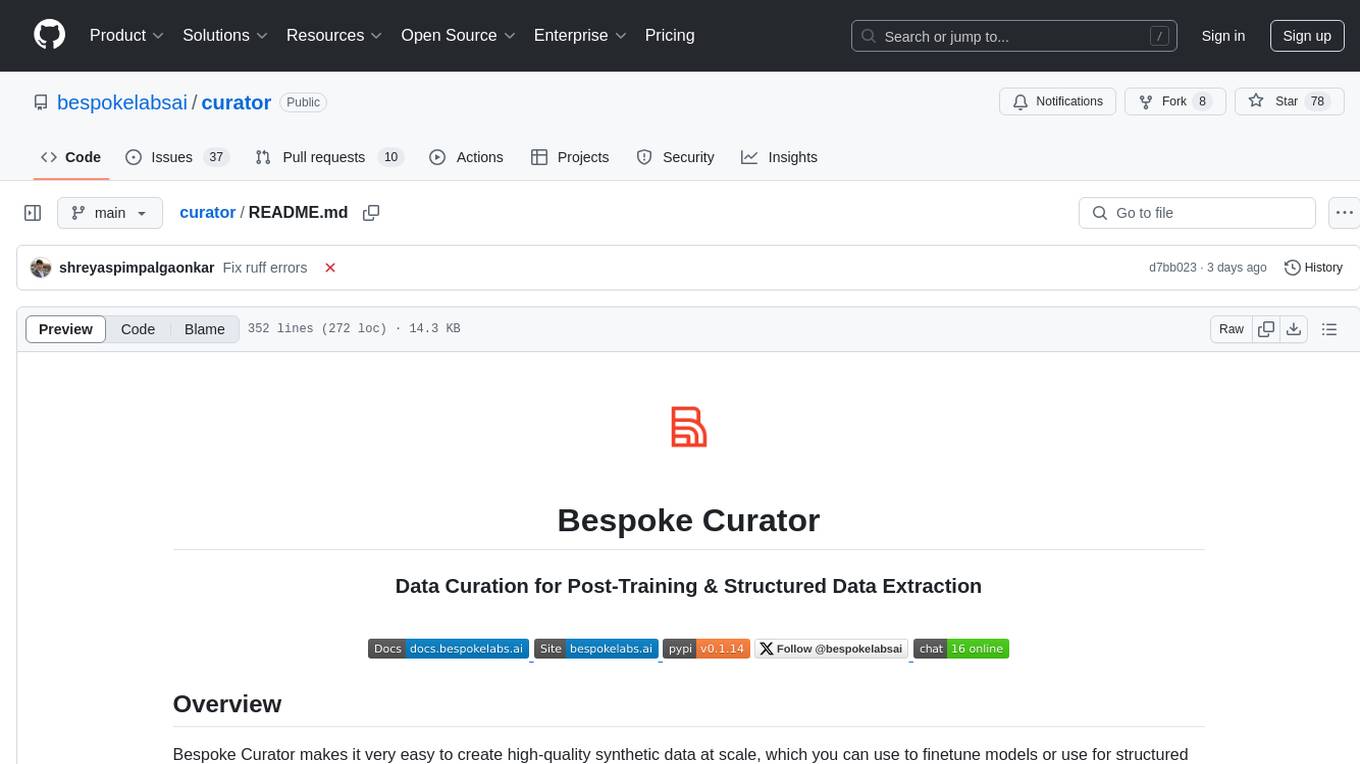
curator
Bespoke Curator is an open-source tool for data curation and structured data extraction. It provides a Python library for generating synthetic data at scale, with features like programmability, performance optimization, caching, and integration with HuggingFace Datasets. The tool includes a Curator Viewer for dataset visualization and offers a rich set of functionalities for creating and refining data generation strategies.
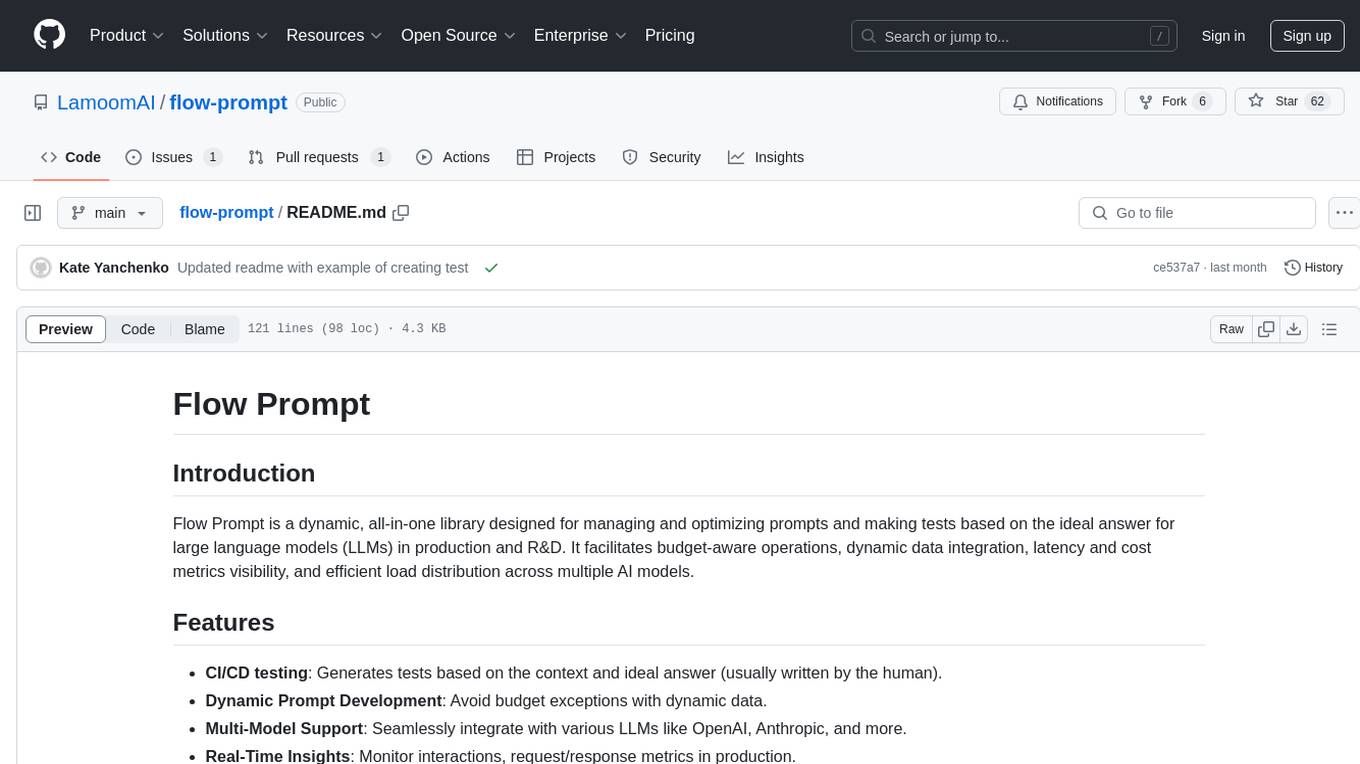
flow-prompt
Flow Prompt is a dynamic library for managing and optimizing prompts for large language models. It facilitates budget-aware operations, dynamic data integration, and efficient load distribution. Features include CI/CD testing, dynamic prompt development, multi-model support, real-time insights, and prompt testing and evolution.

semantic-kernel
Semantic Kernel is an SDK that integrates Large Language Models (LLMs) like OpenAI, Azure OpenAI, and Hugging Face with conventional programming languages like C#, Python, and Java. Semantic Kernel achieves this by allowing you to define plugins that can be chained together in just a few lines of code. What makes Semantic Kernel _special_ , however, is its ability to _automatically_ orchestrate plugins with AI. With Semantic Kernel planners, you can ask an LLM to generate a plan that achieves a user's unique goal. Afterwards, Semantic Kernel will execute the plan for the user.
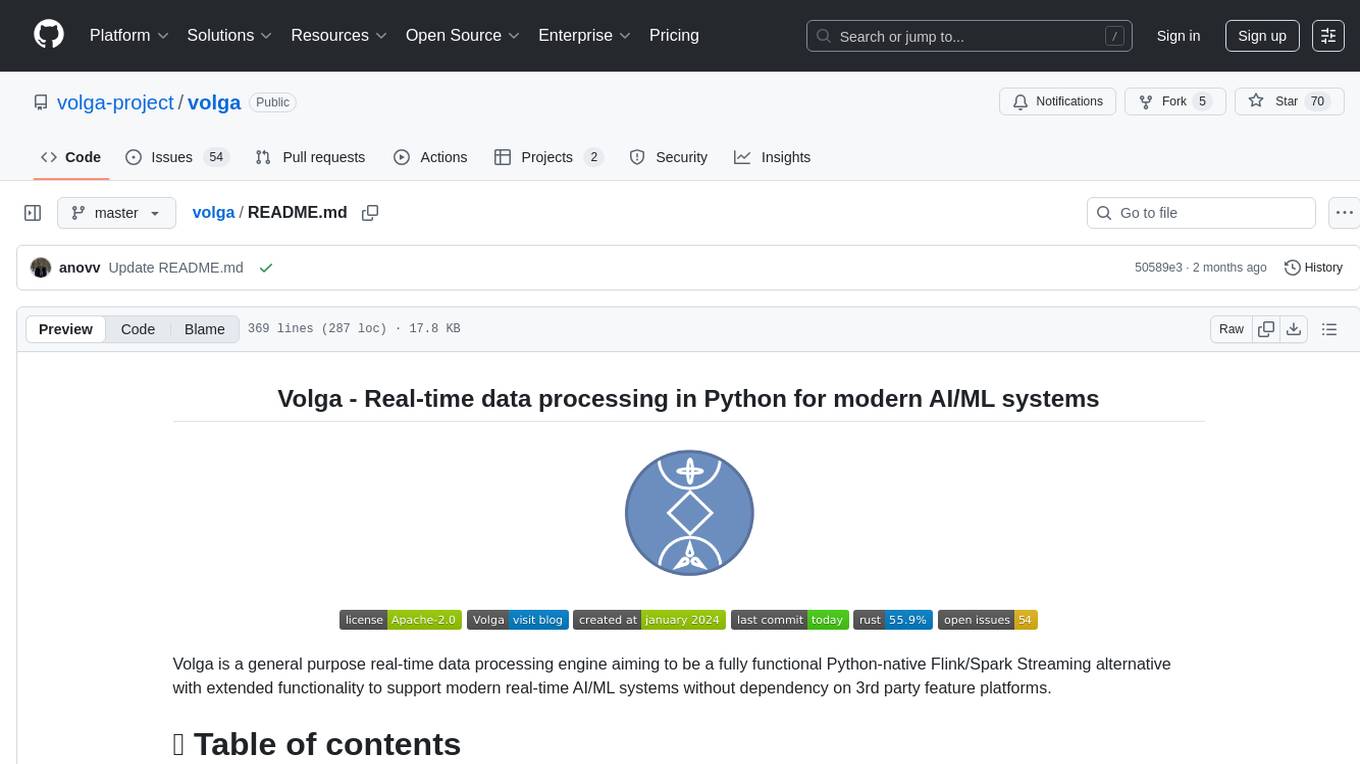
volga
Volga is a general purpose real-time data processing engine in Python for modern AI/ML systems. It aims to be a Python-native alternative to Flink/Spark Streaming with extended functionality for real-time AI/ML workloads. It provides a hybrid push+pull architecture, Entity API for defining data entities and feature pipelines, DataStream API for general data processing, and customizable data connectors. Volga can run on a laptop or a distributed cluster, making it suitable for building custom real-time AI/ML feature platforms or general data pipelines without relying on third-party platforms.
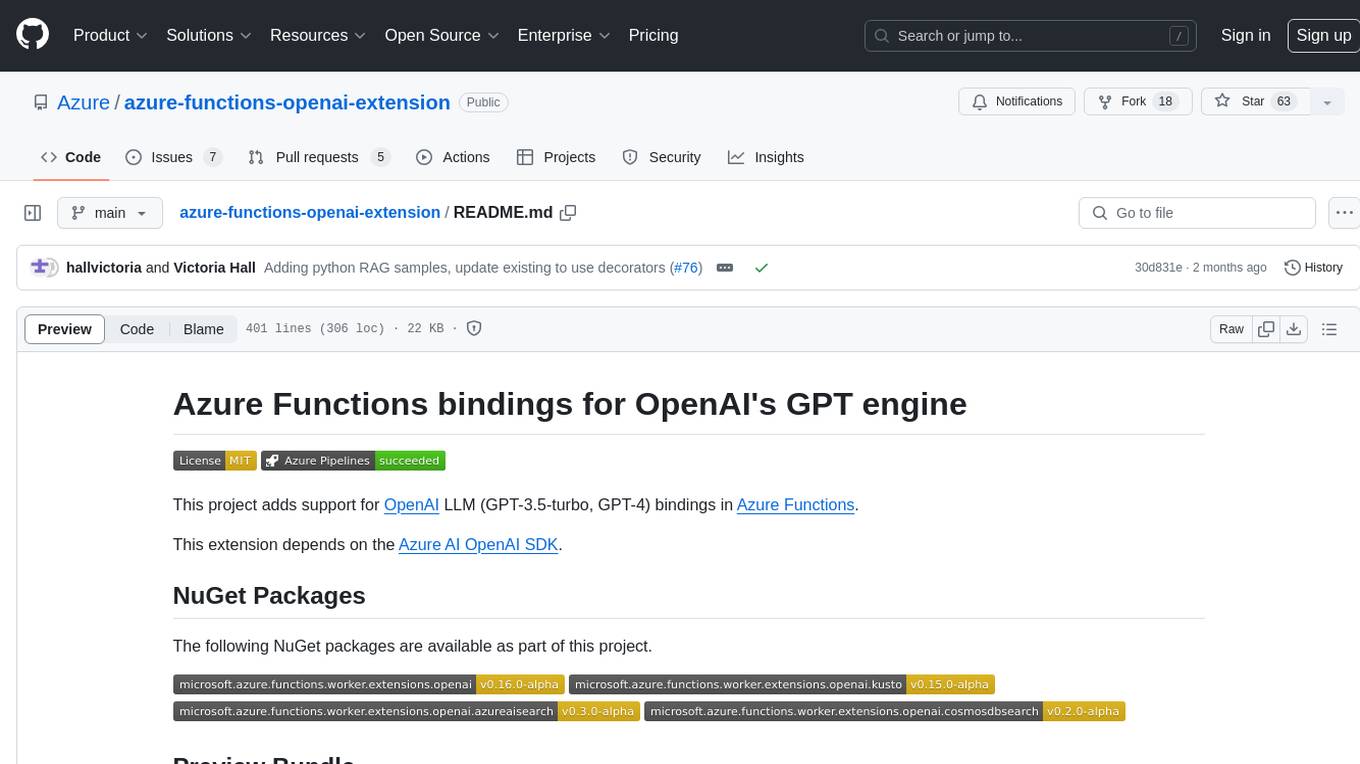
azure-functions-openai-extension
Azure Functions OpenAI Extension is a project that adds support for OpenAI LLM (GPT-3.5-turbo, GPT-4) bindings in Azure Functions. It provides NuGet packages for various functionalities like text completions, chat completions, assistants, embeddings generators, and semantic search. The project requires .NET 6 SDK or greater, Azure Functions Core Tools v4.x, and specific settings in Azure Function or local settings for development. It offers features like text completions, chat completion, assistants with custom skills, embeddings generators for text relatedness, and semantic search using vector databases. The project also includes examples in C# and Python for different functionalities.
For similar tasks

continuous-eval
Open-Source Evaluation for LLM Applications. `continuous-eval` is an open-source package created for granular and holistic evaluation of GenAI application pipelines. It offers modularized evaluation, a comprehensive metric library covering various LLM use cases, the ability to leverage user feedback in evaluation, and synthetic dataset generation for testing pipelines. Users can define their own metrics by extending the Metric class. The tool allows running evaluation on a pipeline defined with modules and corresponding metrics. Additionally, it provides synthetic data generation capabilities to create user interaction data for evaluation or training purposes.
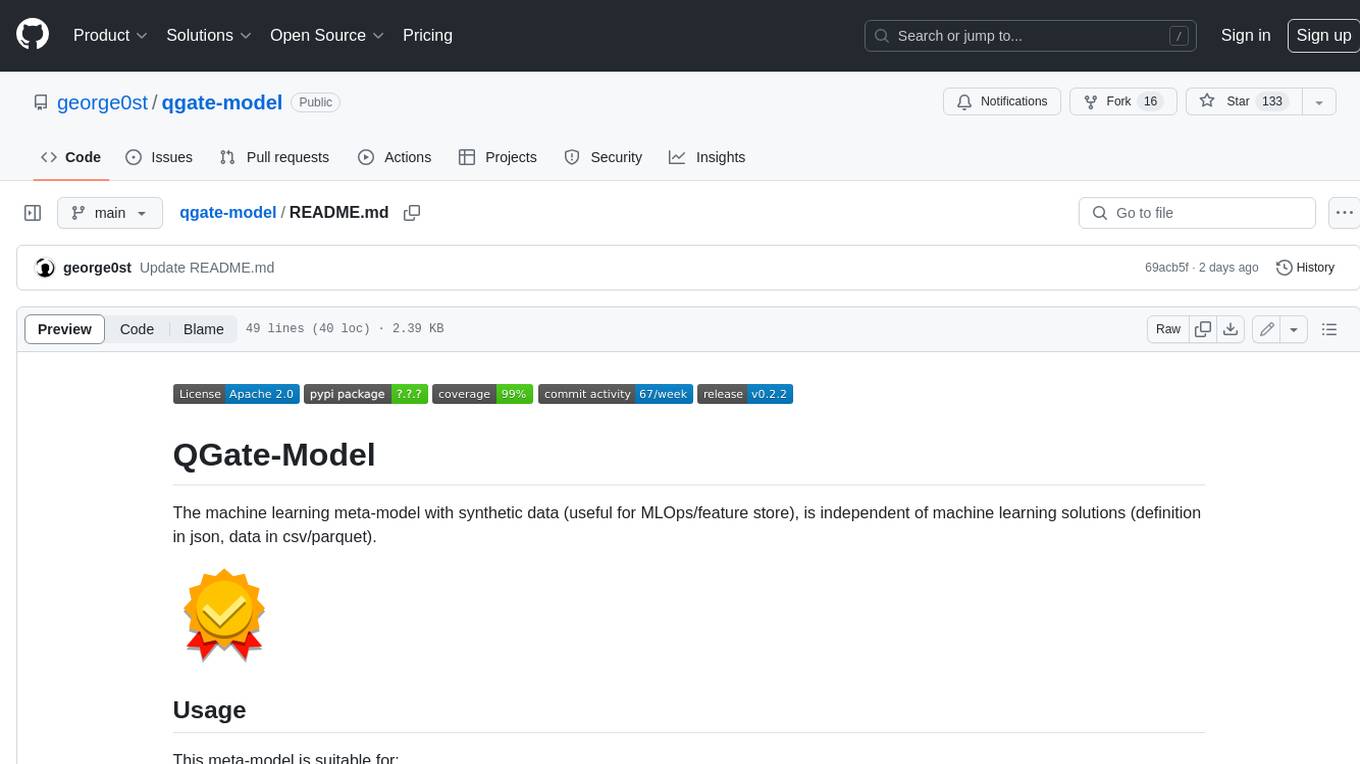
qgate-model
QGate-Model is a machine learning meta-model with synthetic data, designed for MLOps and feature store. It is independent of machine learning solutions, with definitions in JSON and data in CSV/parquet formats. This meta-model is useful for comparing capabilities and functions of machine learning solutions, independently testing new versions of machine learning solutions, and conducting various types of tests (unit, sanity, smoke, system, regression, function, acceptance, performance, shadow, etc.). It can also be used for external test coverage when internal test coverage is not available or weak.
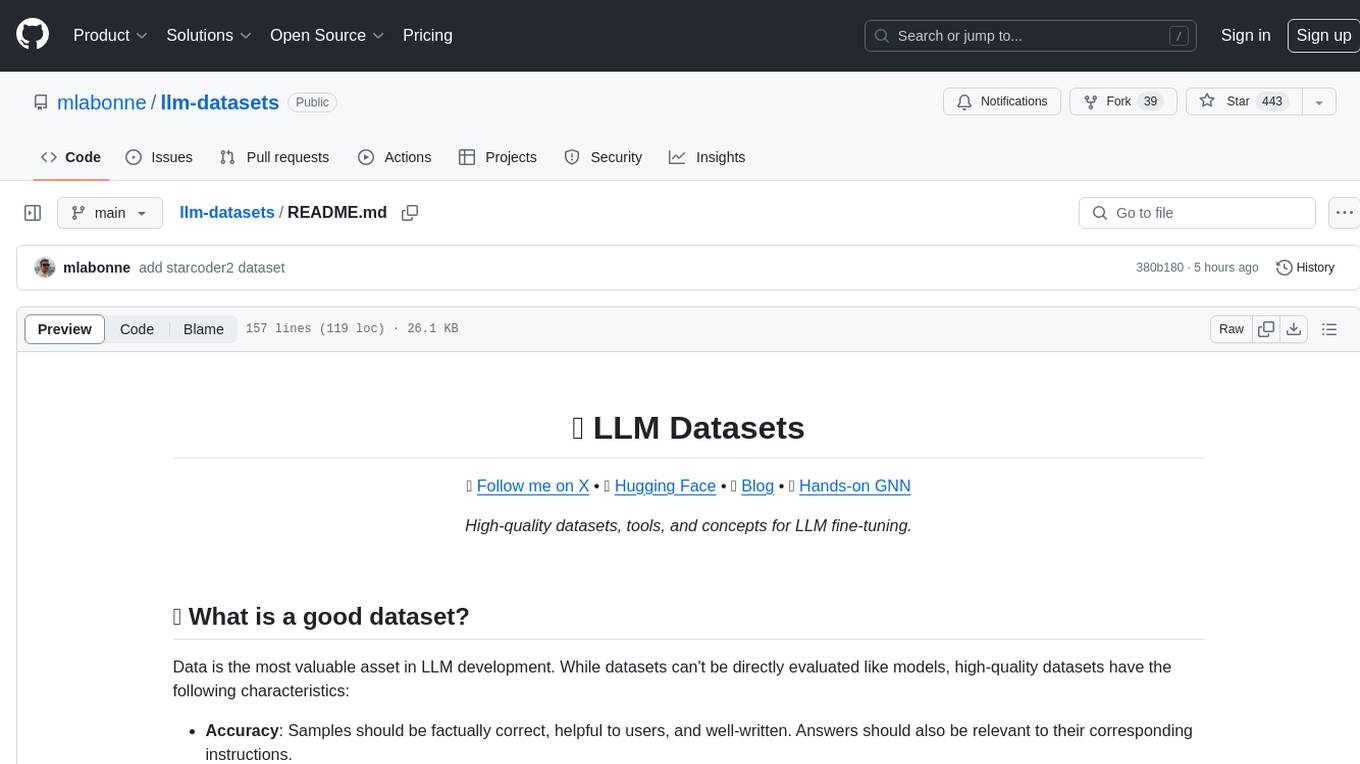
llm-datasets
LLM Datasets is a repository containing high-quality datasets, tools, and concepts for LLM fine-tuning. It provides datasets with characteristics like accuracy, diversity, and complexity to train large language models for various tasks. The repository includes datasets for general-purpose, math & logic, code, conversation & role-play, and agent & function calling domains. It also offers guidance on creating high-quality datasets through data deduplication, data quality assessment, data exploration, and data generation techniques.
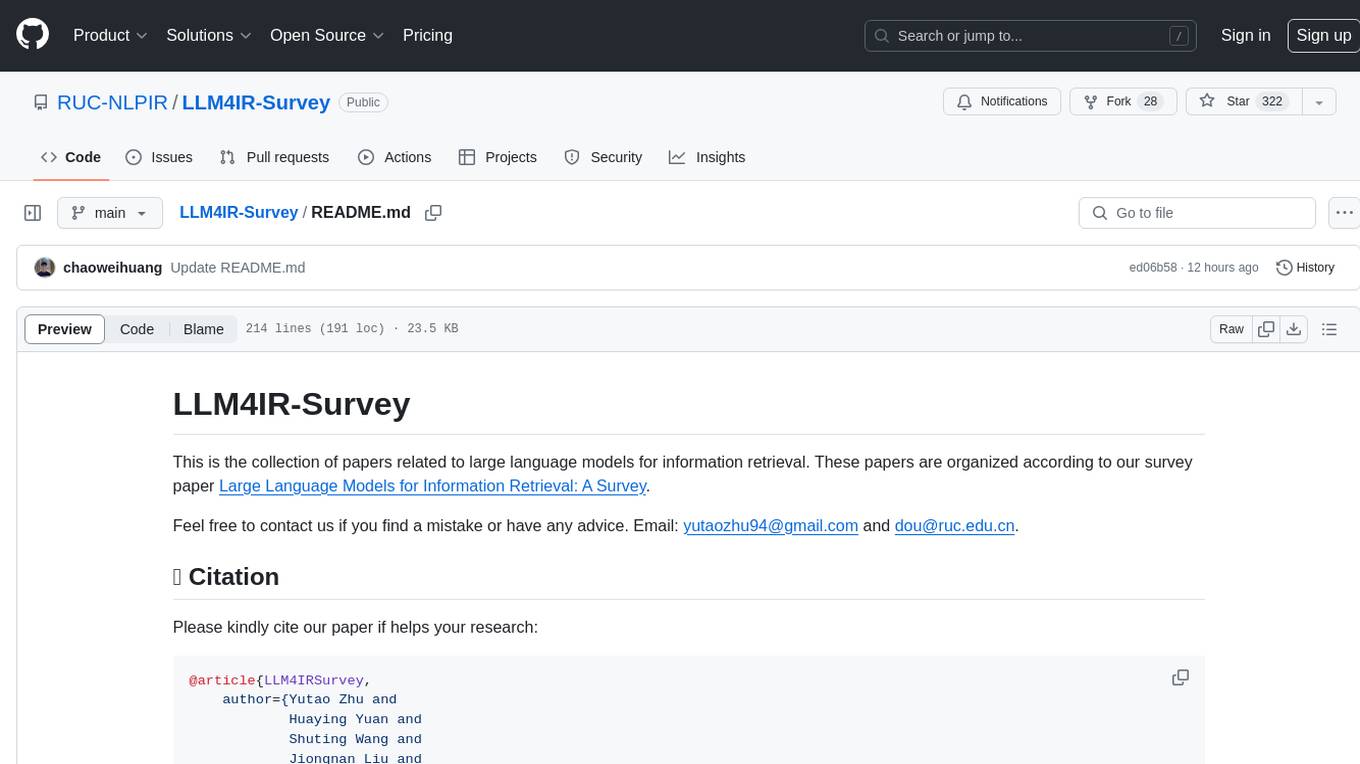
LLM4IR-Survey
LLM4IR-Survey is a collection of papers related to large language models for information retrieval, organized according to the survey paper 'Large Language Models for Information Retrieval: A Survey'. It covers various aspects such as query rewriting, retrievers, rerankers, readers, search agents, and more, providing insights into the integration of large language models with information retrieval systems.
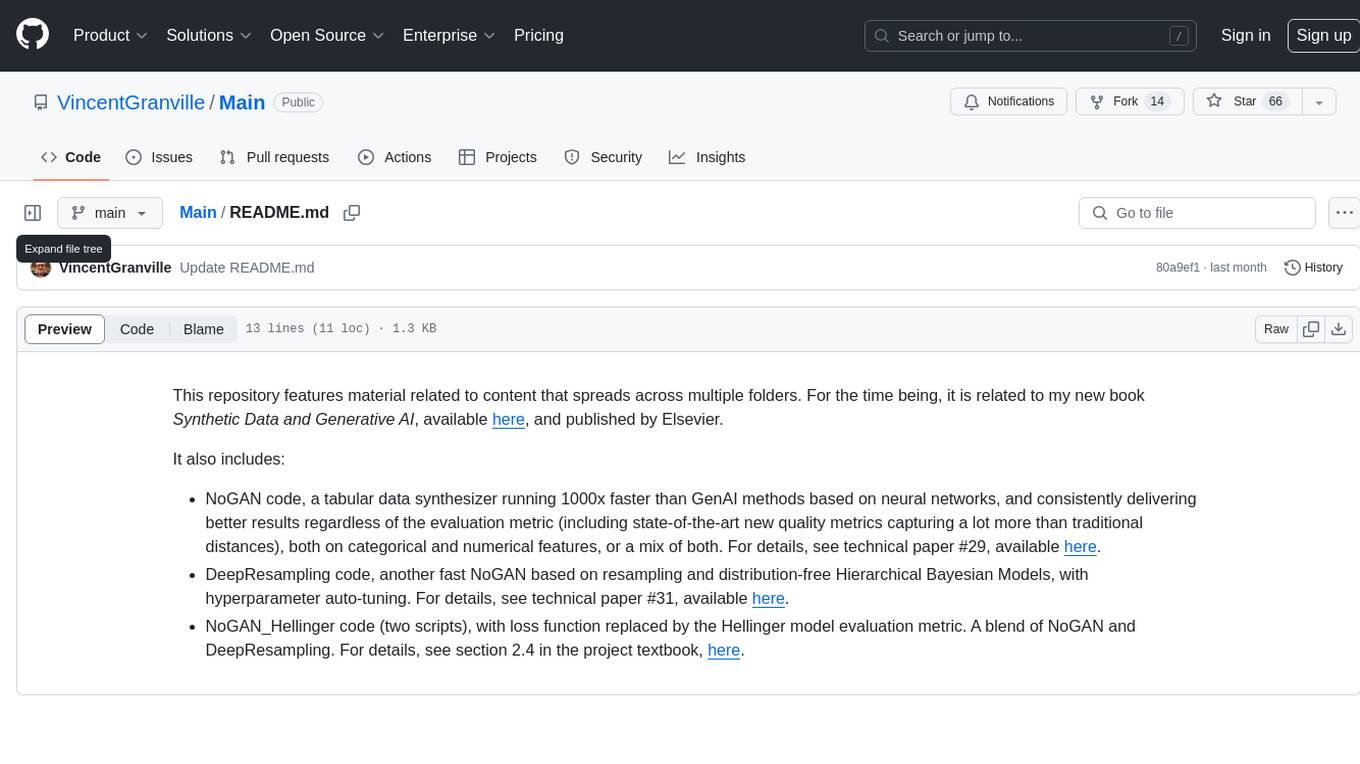
Main
This repository contains material related to the new book _Synthetic Data and Generative AI_ by the author, including code for NoGAN, DeepResampling, and NoGAN_Hellinger. NoGAN is a tabular data synthesizer that outperforms GenAI methods in terms of speed and results, utilizing state-of-the-art quality metrics. DeepResampling is a fast NoGAN based on resampling and Bayesian Models with hyperparameter auto-tuning. NoGAN_Hellinger combines NoGAN and DeepResampling with the Hellinger model evaluation metric.
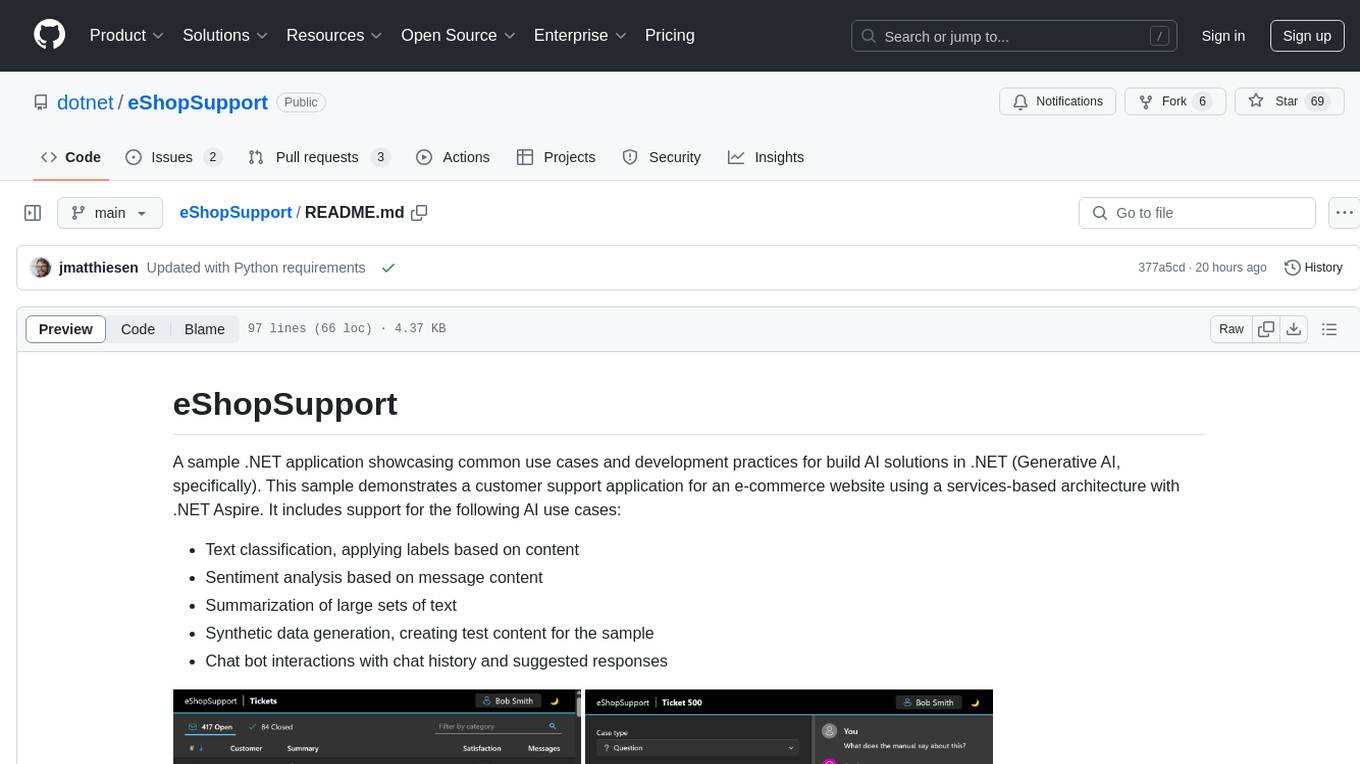
eShopSupport
eShopSupport is a sample .NET application showcasing common use cases and development practices for building AI solutions in .NET, specifically Generative AI. It demonstrates a customer support application for an e-commerce website using a services-based architecture with .NET Aspire. The application includes support for text classification, sentiment analysis, text summarization, synthetic data generation, and chat bot interactions. It also showcases development practices such as developing solutions locally, evaluating AI responses, leveraging Python projects, and deploying applications to the Cloud.
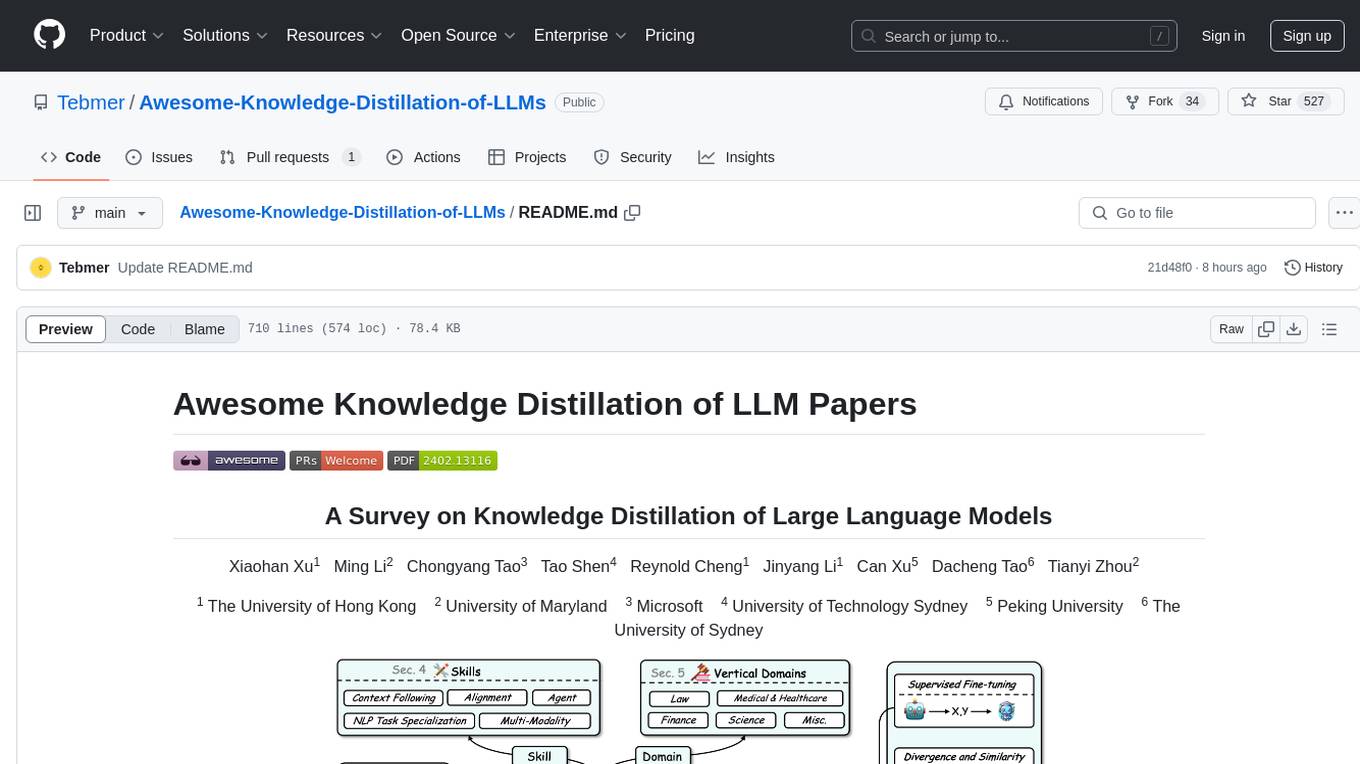
Awesome-Knowledge-Distillation-of-LLMs
A collection of papers related to knowledge distillation of large language models (LLMs). The repository focuses on techniques to transfer advanced capabilities from proprietary LLMs to smaller models, compress open-source LLMs, and refine their performance. It covers various aspects of knowledge distillation, including algorithms, skill distillation, verticalization distillation in fields like law, medical & healthcare, finance, science, and miscellaneous domains. The repository provides a comprehensive overview of the research in the area of knowledge distillation of LLMs.
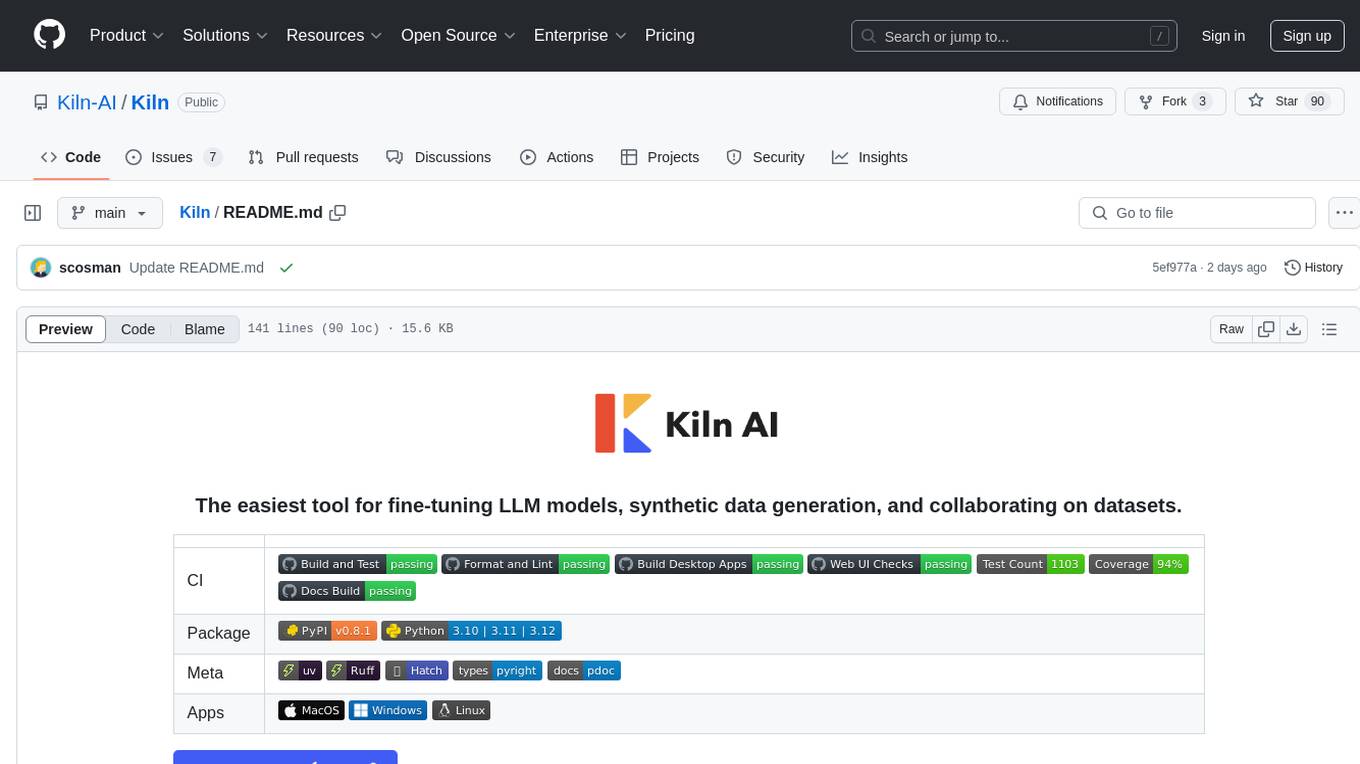
Kiln
Kiln is an intuitive tool for fine-tuning LLM models, generating synthetic data, and collaborating on datasets. It offers desktop apps for Windows, MacOS, and Linux, zero-code fine-tuning for various models, interactive data generation, and Git-based version control. Users can easily collaborate with QA, PM, and subject matter experts, generate auto-prompts, and work with a wide range of models and providers. The tool is open-source, privacy-first, and supports structured data tasks in JSON format. Kiln is free to use and helps build high-quality AI products with datasets, facilitates collaboration between technical and non-technical teams, allows comparison of models and techniques without code, ensures structured data integrity, and prioritizes user privacy.
For similar jobs

weave
Weave is a toolkit for developing Generative AI applications, built by Weights & Biases. With Weave, you can log and debug language model inputs, outputs, and traces; build rigorous, apples-to-apples evaluations for language model use cases; and organize all the information generated across the LLM workflow, from experimentation to evaluations to production. Weave aims to bring rigor, best-practices, and composability to the inherently experimental process of developing Generative AI software, without introducing cognitive overhead.

LLMStack
LLMStack is a no-code platform for building generative AI agents, workflows, and chatbots. It allows users to connect their own data, internal tools, and GPT-powered models without any coding experience. LLMStack can be deployed to the cloud or on-premise and can be accessed via HTTP API or triggered from Slack or Discord.

VisionCraft
The VisionCraft API is a free API for using over 100 different AI models. From images to sound.

kaito
Kaito is an operator that automates the AI/ML inference model deployment in a Kubernetes cluster. It manages large model files using container images, avoids tuning deployment parameters to fit GPU hardware by providing preset configurations, auto-provisions GPU nodes based on model requirements, and hosts large model images in the public Microsoft Container Registry (MCR) if the license allows. Using Kaito, the workflow of onboarding large AI inference models in Kubernetes is largely simplified.

PyRIT
PyRIT is an open access automation framework designed to empower security professionals and ML engineers to red team foundation models and their applications. It automates AI Red Teaming tasks to allow operators to focus on more complicated and time-consuming tasks and can also identify security harms such as misuse (e.g., malware generation, jailbreaking), and privacy harms (e.g., identity theft). The goal is to allow researchers to have a baseline of how well their model and entire inference pipeline is doing against different harm categories and to be able to compare that baseline to future iterations of their model. This allows them to have empirical data on how well their model is doing today, and detect any degradation of performance based on future improvements.

tabby
Tabby is a self-hosted AI coding assistant, offering an open-source and on-premises alternative to GitHub Copilot. It boasts several key features: * Self-contained, with no need for a DBMS or cloud service. * OpenAPI interface, easy to integrate with existing infrastructure (e.g Cloud IDE). * Supports consumer-grade GPUs.

spear
SPEAR (Simulator for Photorealistic Embodied AI Research) is a powerful tool for training embodied agents. It features 300 unique virtual indoor environments with 2,566 unique rooms and 17,234 unique objects that can be manipulated individually. Each environment is designed by a professional artist and features detailed geometry, photorealistic materials, and a unique floor plan and object layout. SPEAR is implemented as Unreal Engine assets and provides an OpenAI Gym interface for interacting with the environments via Python.

Magick
Magick is a groundbreaking visual AIDE (Artificial Intelligence Development Environment) for no-code data pipelines and multimodal agents. Magick can connect to other services and comes with nodes and templates well-suited for intelligent agents, chatbots, complex reasoning systems and realistic characters.





